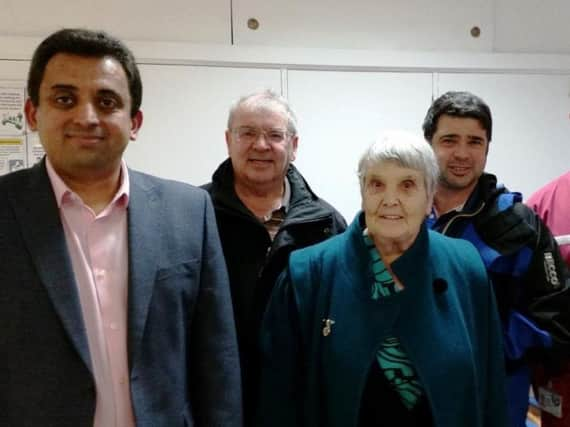Patients given life saving treatment that was pioneered at Calderdale hospital


Michael Hatfield, of Hebden Bridge, and Barbara Dyson, from Mount Tabor, Halifax, have both received Endovascular Aneurysm Repairs (EVARs), which repair abdominal aortic aneurysms - life-threatening swelling of the main artery within the body - without the need for surgery.
Traditionally, abdominal aortic aneurysms treated by EVARs usually require the groin to be opened by vascular surgeons before the radiologists can introduce the stent - which helps keep the passageway open - under x-ray guidance.
Advertisement
Hide AdAdvertisement
Hide AdConsultant Interventional Radiologist, Dr Chalam Viswanathan, from the Calderdale and Huddersfield NHS Trust, has performed more than 150 EVARs to date and now he has embarked on this new technique where no surgery is required in the groin for access in order to place the stents.
Mr Hatfield’s aneurysm was discovered during imaging for cancer. The 79-year- old had his chemotherapy suspended for the stents procedure to go ahead at Huddersfield Royal Infirmary.
After one night in hospital he was able to return home. He said: “There’s been no problem I am feeling fine as a result of this procedure.”
When Mrs Dyson’s GP got her abdominal scan results back he told her the seriousness of her situation before sending in for stents.
She said: “He told me ‘you’re a ticking time-bomb’.”
Advertisement
Hide AdAdvertisement
Hide AdA large aneurysm had been discovered after she had been suffering with stomach pains. She attended at the Surgical Assessment Unit at Huddersfield Royal Infirmary before having the procedure..
She came back to the hospital with her husband Geoffrey and son David to thank Dr Viswanathan and his team. She said: “Everyone here is brilliant. Technology has come on so much in medicine. It’s amazing.”
Dr Viswanathan said: “I am so glad we are able to offer this to our patients. This technique can be performed on patients who fit in a certain criteria. The patient has no surgical scar in the groin, recovery is fast and if they had it as an elective procedure they can potentially be discharged the next day.
“I would also like to thank Anver Mohammed, consultant vascular surgeon, for all his moral support and his presence so that I could start this service. Surgical back up is important.”